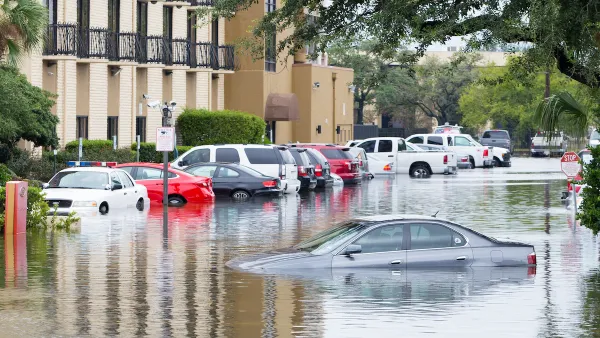The Resilient Houston initiative promises to strengthen the city's infrastructure and increase its capacity to thrive and adapt under crisis.

Luis Guajardo of Rice University's Kinder Institute for Urban Research assesses the city of Houston's progress on its 2020 "resilience strategy," adopted "to improve the capacity of individuals, communities, institutions, businesses and systems within the Houston region to not only survive any and all chronic stresses and acute shocks they might experience, but adapt and thrive."
The initiative, Resilient Houston, addresses potential "shocks and stresses" including natural disasters, public health threats, and infrastructure failures. After Texas's "short-sighted, deregulatory approach to energy policy" had disastrous effects during the recent winter storm that left millions across the state "stranded in their homes for days without power, heat, potable water and food," Houston leaders and stakeholders must redouble their efforts to build resiliency into the city's infrastructure.
Highlights of progress made in the last year include the construction of over 36,000 residential units, new incentives for property owners who install green stormwater infrastructure, and the planting of close to half a million trees.
The Institute plans to track future progress even more closely. "Later this year, the Kinder Institute will launch its Resilience and Recovery Tracker, which consolidates the recovery, mitigation and adaptation efforts of Harris County and the City of Houston on one website," and "can be used to access spending dashboards, interactive maps and thematic pages related to recovery from — and resilience to — extreme events."
FULL STORY: One year in, what progress has Houston made in its plan to build resilience?

National Parks Layoffs Will Cause Communities to Lose Billions
Thousands of essential park workers were laid off this week, just before the busy spring break season.

Retro-silient?: America’s First “Eco-burb,” The Woodlands Turns 50
A master-planned community north of Houston offers lessons on green infrastructure and resilient design, but falls short of its founder’s lofty affordability and walkability goals.

Delivering for America Plan Will Downgrade Mail Service in at Least 49.5 Percent of Zip Codes
Republican and Democrat lawmakers criticize the plan for its disproportionate negative impact on rural communities.

Test News Post 1
This is a summary

Test News Headline 46
Test for the image on the front page.

Balancing Bombs and Butterflies: How the National Guard Protects a Rare Species
The National Guard at Fort Indiantown Gap uses GIS technology and land management strategies to balance military training with conservation efforts, ensuring the survival of the rare eastern regal fritillary butterfly.
Urban Design for Planners 1: Software Tools
This six-course series explores essential urban design concepts using open source software and equips planners with the tools they need to participate fully in the urban design process.
Planning for Universal Design
Learn the tools for implementing Universal Design in planning regulations.
EMC Planning Group, Inc.
Planetizen
Planetizen
Mpact (formerly Rail~Volution)
Great Falls Development Authority, Inc.
HUDs Office of Policy Development and Research
NYU Wagner Graduate School of Public Service





























